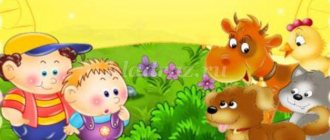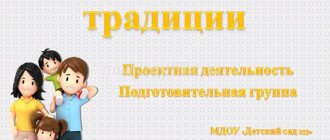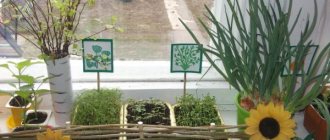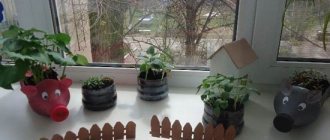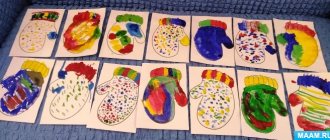Project on interaction between a kindergarten and a children's library.
Project
on the interaction of a kindergarten with a children's library.
Relevance:
A modern person cannot be considered cultured if he does not expand his knowledge and does not form his spiritual essence by reading books. It is in them that the centuries-old wisdom of mankind is contained. Modern children prefer to spend their free time watching TV shows and playing computer games to the detriment of reading books. In the age of information technology and the rapid development of the global information network, the importance of the book and its deep and thoughtful reading should in no way be diminished. Thus, one of the forms of organizing work on the socialization of a child’s personality was interaction with the library.
The mission of libraries is to, using all available resources, provide children with optimal conditions for cultural development, formation and satisfaction of their educational, communicative and other needs, in other words, to create an environment for the development of the child through reading, books and other types of materials that meet his gender, age, sociocultural and individual characteristics.
Together with library staff, we discussed the goals and objectives of the upcoming work. We developed a plan for joint activities, clarified the specifics of conducting direct educational activities, excursions, leisure activities, both in kindergarten and at the library, and the possibility of using the library’s book fund for classes with preschoolers in preschool educational institutions and in the families of pupils.
Objective of the project:
Formation of an integral sociocultural system of interaction between preschool educational institutions and the children's library Objectives:
Expand the creative interaction of preschool educational institutions with cultural institutions to create a unified sociocultural pedagogical system.
2. Implement an integrated approach to aesthetic education and the formation of artistic and creative abilities in the “child-teacher-parent” system.
3. Contribute to the development of the spiritual and moral culture of participants in the educational process.
Project type: (
educational and social-educational)
Project participants:
preschool teachers, parents, students, children's library staff
Forms of succession:
- excursions to the library;
- acquaintance and interaction with the library;
- visit to the library mini-museum;
- exhibitions of drawings and crafts;
- participation in theatrical activities
- joint holidays;
Project stages
Preparatory stage
Goal: determining the goals and forms of interaction with the children's library
- analysis of social objects to determine the feasibility of establishing a social partnership;
- establishing contacts with the organization
- determination of areas of interaction, deadlines, goals and specific forms of interaction
Practical stage
Goal: implementation of cooperation with the children's library
Tasks:
- Drawing up agreements on creative cooperation between a kindergarten and a children's library.
Drawing up a plan for joint activities for the academic year
| № | month | Events | responsible | |||
| 1 | September | “House of Books” (excursions to the library, introduction to the profession of a librarian) | Librarian, educators | |||
| 2 | October | Autumn holiday. "Autumn leaf fall." Let's draw autumn to the music. | Librarian, educators | |||
| 3 | november | “Visiting Grandfather Korney” (quiz based on the works of K.I. Chukovsky) | Librarian, educators | |||
| 4 | December | "Santa Claus's Birthday" | Librarian, educators | |||
| 5 | January | “Once on a quiet evening the girls were wondering...” | Librarian, educators | |||
| 6 | February | For Defender of the Fatherland Day: | Librarian, educators | |||
| 7 | March | “There is no one in the world sweeter than mommy” | Librarian, educators | |||
| 8 | April | “Knizhkina Hospital” - book repair. | Librarian, educators | |||
| 9 | May | “Holiday with tears in our eyes” (exhibition of children’s drawings dedicated to Victory Day.) “Remember the rules of the road” (quiz) | Librarian, educators | |||
| 10 | June | |||||
| 11 | July | “The fairy tale is a lie, but there is a hint in it...” | ||||
| The final stage Target: summing up the results of social partnership. Tasks of this stage:
| ||||||
Interaction between kindergarten, family and library in child development article (preparatory group)
Interaction between kindergarten, family and library in child development
Today in society, reading ceases to be an absolute value; its loss becomes a huge problem.
The reading experience of many generations testifies that interest in books arises precisely in preschool childhood, because the feelings of a preschooler are particularly emotional. And the earlier an interest in reading appears, the more significant and deeper a reader, a creative personality, a person with a high intellectual level is formed.
In recent years, our country has experienced a crisis in children's reading.
If ten years ago a preschooler always read a book with his parents at night, now books have been replaced by computer games, television and other “benefits” of the 21st century. Parents are increasingly wondering why their children do not read, forgetting first of all that love for a book begins with an example. It is necessary to instill a love for the printed word at a very early age.
By introducing a child to reading, we not only open the way for him to one of the most important sources of information, a book fills a person’s inner world, nourishes his mind and heart, encourages self-awareness, promotes self-realization, and fosters resilience, no matter what situations he finds himself in.
How to preserve the love of reading and pass it on to the younger generation?
The answer is simple! It is necessary to instill a love for books from early childhood, to light this fire in the soul of a child, which will lead him into the vast world of fiction.
Reading with family creates a special atmosphere of mutual understanding, and love and interest in the book is passed on from elders to younger ones. The ability to listen, sympathize, and empathize is formed precisely in moments of collective perception of what has been read, when older family members express their attitude to the events, characters, and language of the work.
Unfortunately, I had to admit that books and family reading do not occupy the first place in children’s lives.
To effectively solve the problem of introducing preschoolers to reading (perceiving) books, in 2015 an agreement was concluded on the interaction of the Children's Educational Institution "Child Development Center - Kindergarten No. 70" with the children's city library located on Kommunisticheskaya Street, 46.
The goal of this interaction is for children to master the basic cultural and moral values of society through joint activities with teachers, parents and children's library workers.
In accordance with the goal, the following tasks were set:
• development in children of cognitive interest in objects and phenomena of the surrounding reality, the formation of a holistic picture of the world;
• developing interest and need for reading (perception) of books;
• development of literary speech, artistic perception and aesthetic taste, broadening the horizons of children;
• formation of value guidelines in children by getting to know the culture and traditions of their native country, preschoolers’ awareness of family and citizenship, and nurturing patriotic feelings;
• increasing the pedagogical competence of parents.
The pupils of our group became acquainted with the library in middle preschool age, when library representatives came to us with interesting, educational presentations and brought books with them, but they began to work closely with the library in 2021, when they moved to senior preschool age
Caring, knowledgeable library workers Irina Alekseevna, Yulia Sergeevna and Elizaveta Mikhailovna interested the children so much that we began to meet with them every month.
In September 2021, we organized excursions to the city children's
library, where children got acquainted with the subscription and reading room, with new products in the world of books, with the professional actions of employees and the rules of conduct in the library. In the reading room, children not only got acquainted with books and their characters, but also read their favorite poems, watched cartoons based on familiar works, and actively participated in quizzes: “For the 300th anniversary of the city of Polevsky”, “Our writer P.P. Bazhov”.
Familiarity with the structure and operation of the library made the children want to create a real library in a group. Many parents supported our initiative and replenished our library in the group with interesting and exciting books that they brought from home. This is how the group library was born. Children began to turn to books more often, look at illustrations, become interested in the plots of works and discuss them. The plot-based role-playing game “Library” arose. The objectives are: to introduce children to library terminology and the rules of behavior in the library; develop an understanding of the significance of books in life; develop independence, communication skills and creativity; ability to analyze and compare; cultivate interest and respect for the book.
Children initiate the game, agree on roles, change them, and constantly develop and enrich the plot. Everyone wants to take on the role of a librarian and give out books to “readers.” It’s hard to say whether this is a game, because everything in it is real: real books, real children - readers, and even real library forms.
Of course, in the process of getting acquainted with books, reading them and looking at them, books break down: pages tear and jump out, covers become damaged. In this case, our group has a “Knizhkina Hospital” that repairs books. Children repair and restore “sick” books in a timely manner, with great desire and care. We note that our students have become much more careful with books, especially those that have been in the “hospital.” We keep a reading diary, where children draw pictures based on the works they read. Children and their parents can take books from our library home to read for a certain time, which is specified in the library form.
Our group participated in the competition “Best Corner of Fiction” and took 1st place among all groups of our preschool educational institution. We received the book “The Great Encyclopedia of Knowledge” as a gift.
Also in the kindergarten there is a mobile library, when library staff once a month bring books to the kindergarten for us to read, and we, in turn, return to the library those that we have already read and reviewed.
In October, our kindergarten held a recitation competition “Poems about Mom”: Yesenia took 3rd place, and Vanya S. took 2nd place.
In November, during the week of the preschool educational institution “Creativity of Children’s Writers,” an exhibition of A. Barto’s books was organized in groups by teachers and parents. The group’s students, together with library staff, created a cartoon based on A. Barto’s poem “The Juggler.”
In December 2021 Pupils of grade 5 “B” from Polytechnic Lyceum No. 21 “Erudite” came to our preschool institution to show us a fairy tale and give us books. We, in turn, made our own bookmarks and gave them to the students.
Three students from our group participated in an intellectual game among preschool institutions in our city and took 2nd team place. For winning we received an encyclopedia about our planet Earth.
For preschoolers, dramatization is extremely interesting - acting out the text in faces. Transformation into an artistic image makes it possible to show how the child understands the text, evaluates the characters, and imagines events. Staging becomes the most important technique in working with a literary text.
Our children actively participate in theatrical activities, love to turn into actors, and actively discuss the scenery and costumes. All conditions have been created for this in the group. For Mother's Day, the guys showed a re-enactment of the fairy tale “How a kitten was looking for its mother” for mothers and grandmothers.
Parents note that their children’s interest in books has increased significantly, which is very important when preparing for school.
Parents are our partners and participants in the educational process. To educate them, in informational parent corners we post consultations and reminders on the topics “What to read to a child?”, “Reading a fairy tale,” “Pure twisters and tongue twisters in the life of a preschooler,” and others.
Parents and children are regular participants in various competitions: Dasha T.’s family participated in the photo competition “My portrait with my favorite book” and took 1st place. The family of Timofey B. participated in the all-Russian quiz dedicated to the work of K.I. Chukovsky. Olya L.'s family took part in an international quiz dedicated to the work of A.L. Barto.
In October, pupils, together with their parents, participated in an exhibition of drawings based on the works of V.G. Suteev, which was located in our preschool educational institution.
In September and December 2021, our students, together with their parents, actively participated in the “Save the Tree” waste paper collection event, organized by the staff of our preschool educational institution. Children, parents of other groups and kindergarten staff joined this action. We saved a lot of trees and took 3rd place among all groups, our library was replenished with a new encyclopedia about Dinosaurs for the place we took. Children began to take care of their native nature. After drawing or appliqué, the paper is no longer thrown into the trash, but is put into specially prepared boxes to save more trees.
To summarize, we can talk about the effectiveness of the work done:
— children’s interest in reading and books has increased, children are actively involved in reading activities. Board games “Syllables and Words”, “Fun Alphabet”, “Letters” and others are in great demand among children. Of the 25 children in the group, 7 read fluently, 9 read syllables well and reflect what they read in their drawings;
I would also like to note that children’s speech has become more expressive, clear, and emotional. The practice of “family reading” has strengthened, the authority of the city library has increased, and parents with children have become more active in using its services.
There is every reason to believe that the love of books and reading will remain in children throughout their lives.
By introducing children and adults to reading, we not only open the way for them to one of the most important sources of information, the book fills a person’s inner world, nourishes their mind and heart, encourages self-awareness, promotes self-realization, and fosters resilience.
Work experience “Cooperation between preschool educational institutions and libraries.”
Work experience “Cooperation between preschool educational institutions and libraries”
“Reading is a window through which children see and learn about the world and themselves” V.A. Sukhomlinsky
Nowadays, you can read anywhere – on a tablet or computer, in an “electronic book”. Whichever is more convenient for you. But there are people who simply need to feel the rustle of paper, inhale that smell of new or not so new pages, because each book smells differently, and the smell is its story. And there’s nothing to say about children - only books! Real, fabulous, magical, bright, exciting, educational - so different, and so beloved. The process of a child’s communication with a book is the process of developing a personality in him. The impact of fiction on the mental, aesthetic, and speech development of a child is well known. Fiction opens and explains to the child the life of society and nature, the world of human feelings and relationships. It develops the child’s thinking and imagination, enriches his emotions, and provides excellent examples of the Russian literary language
Most often, acquaintance with books begins in early childhood: parents (grandparents) introduce their child to colorful children's books, alluring with their brightness and pictures.
As a child grows up, there comes a time in his life when he gets acquainted with a large number of books in the halls of children's libraries.
How does a child’s first acquaintance with the library happen?
The first time our group went on an excursion to library branch No. 3 was at the age of four. The children's acquaintance began with a tour of the library premises. During the excursion, the children's attention was drawn to the fact that there are many books in the library, but they all stand in their places, on shelves, near their letter separator (by the author's last name or by topic). The children were most interested in the shelves with children's literature. The children leafed through the books and looked at the illustrations. During the first excursion, the children were told about the history of the book. The children learned to be careful with books.
The visit to the library ended with games and the presentation of souvenirs. So our meetings became regular.
At the beginning of each school year, a plan of events was drawn up between the group teachers and library staff, according to the calendar plan of education at the preschool educational institution, calendar-ritual and secular holidays. Classes were held at the library twice a month using game elements, quizzes, and competitions. Because it is thanks to playful forms that children actively remember the proposed material.
For three years, children became acquainted with the work of children's writers.
These are K.I. Chukovsky, S.Ya. Marshak, A. Barto, S. Mikhalkov, E. Charushin, N. Nosov, E. Uspensky, V. Bianki, N. Sladkova, Suteev and others. The children were told about the works of writers, read their works, and looked at illustrations for books. We watched cartoons based on the works of writers. Information about writers and their works were selected taking into account the age characteristics of children. Library staff conducted quizzes on the works of writers. To consolidate the information received, in our group we organized an exhibition of books by the writer we were studying, read stories, and drew illustrations for the works. The drawings were taken to the library, where exhibitions were arranged.
Children took part in preparation for library events with pleasure: they learned poems, made crafts from paper and natural materials, drew pictures and illustrations for their favorite books.
At an older age, children became acquainted with the works of foreign writers: G.H. Andersen, C. Perrault, Brother Grimm. A quiz “Visiting a Fairy Tale” was held based on the works.
Every year “Reshetov readings” are held in our city. For Bereznikov, Alexey Reshetov is more than a poet. We also did not stay away from this event. In the library, our children were told about the biography and work of the poet. And the children learned the poems of A. Reshetov and we organized mini “Reshetov readings”. The children also drew drawings for the exhibition “My City – Berezniki”.
Quite a lot of time has passed since the Great Patriotic War, but the feat of the Soviet people will always remain a source of pride for posterity. Therefore, we must educate the younger generation so that children know, remember and honor the feat of their grandfathers and great-grandfathers. The joint work of preschool teachers and library staff included a series of events aimed at the patriotic education of preschoolers: conversations about the war, the siege of Leningrad, and the heroism of people during the war. Stories and poems about the war were read to the children. We looked at the illustrations. Met with veterans. They laid flowers at the Eternal Flame. Our student took part in a patriotic poetry competition.
In the preparatory group, children were introduced to the holiday of Slavic writing and culture, which is celebrated on May 24. A lesson “Where the alphabet came from” was held. The children learned about Cyril and Methodius, how the first alphabet was created, and what the letters looked like. The acquaintance with the creation of the alphabet continued. Children and parents of our group took part in the “Unusual Letter” competition. Children examined the writing of letters in the old style, and tried to unravel the patterned mystery of the capital letter (A capital letter is a large and intricately designed first letter of a text, which has always been an important part of the art of decorating books).
Cooperation between the library and kindergarten also took the form of organizing joint holidays.
It has become a good tradition to organize gatherings for the Day of the Elderly and for Mother’s Day in the library. The children prepared for the gatherings with great pleasure: they painted portraits of their mothers or grandmothers, wrote stories about them, designed greeting cards, read poems, and showed various theatrical plays. Our get-togethers always ended with tea and refreshments.
But the most interesting thing for the children was getting to know Orthodox holidays. Every year in the library we celebrated calendar and ritual (Orthodox) holidays: Christmas, carols, Maslenitsa, Easter. The children learned with great interest the history of Orthodox holidays. Depending on the age of the children, they were given information about a particular holiday. It was told where this holiday came from, how our ancestors celebrated it. Folk games and competitions were held during the holidays. The constant guests of these gatherings were the parents of the students, as well as grandparents. Parents took part with great pleasure in decorating the table (tea party) and in competitions. It was very nice to see grandmothers who participated in competitions, competing with their grandchildren.
The library also hosted events aimed at broadening children’s horizons: “Flower Kaleidoscope”, “What do you know about animals”, “From the history of your hometown”, “Tea gatherings” and others.
But not only children went to the library, but also library staff came to visit the kindergarten. There was a feedback loop between the library and the kindergarten. Library staff helped organize book exhibitions in the group with their library resources.
Anastasia Anatolyevna spoke at parent meetings, talking about the importance of reading books to children, what books to choose for children, and how to read. Conducted competitions and quizzes among parents and children.
We are convinced that a book should enter a child’s world as early as possible, enrich it, make it interesting, full of unusual discoveries and new knowledge.
Agreement on cooperation between a preschool institution and a children's library
Agreement on cooperation
MDOU "Kindergarten No. 71 of general developmental type" in Magnitogorsk and
MKUK "Centralized Children's Library System"
Children's Library No. 2 of Magnitogorsk
Magnitogorsk September 1, 2021
Municipal preschool educational institution "Kindergarten No. 71 of a general developmental type" of the city of Magnitogorsk, hereinafter referred to as the "Institution", represented by the head Fokina I.R. and the Municipal State Cultural Institution "Centralized Children's Library System" Children's Library No. 2 of Magnitogorsk, hereinafter referred to as the "Library", on the other hand, represented by T.L. Shaldina, have entered into this agreement as follows:
1. The Subject of the Agreement
1.1. This agreement is aimed at resolving issues regarding the organization of cooperation between the Library and the Institution;
1.2. The parties act on the basis of the Federal Law of December 29, 2012 No. 273-FZ “On Education in the Russian Federation”.
1.3. The goal of the joint activities of the parties is to create favorable conditions for education and upbringing, the development of a broad outlook in children, and the development in children of a primary reading interest in literary works of various genres and a value attitude towards fiction as an art form. Expanding knowledge among preschool children about the culture, history of their native land, native language, native state and its identity. Instilling a love of reading. Providing assistance to the teaching staff in the selection of methodological literature.
1.4. The parties jointly develop and implement activities aimed at the educational activities of children. The parties interact in accordance with the approximate cooperation plan approved by both parties.
1.5. The agreement is accompanied by a plan for the joint work of the Institution and the Library.
Rights and obligations of the parties:
2.1. The library undertakes:
2.1.1. Provide assistance to the Institution in organizing work on the social, personal, artistic, aesthetic, and cognitive development of children of middle and senior preschool age;
2.1.2. Provide kindergarten advice and selection of fiction appropriate to the age of the children;
2.1.3. Conduct activities with children using illustrations, paintings, books;
2.1.4. Provide literature for temporary use based on the conditions in force in the library;
2.1.5. Ensure compliance with sanitary and hygienic standards, fire safety rules, safety regulations, moral and ethical rules of conduct during children’s stay in the library.
Social partnership: library - kindergarten
17.02.2018
- 3.14
Votes: 477
“The way childhood passed, who led the child by the hand during childhood, what entered his mind and heart from the world around him - this decisively determines what kind of person today’s child will become...” V. A. Sukhomlinsky
photo
The formation of a person’s spiritual culture is always carried out through reading. Instilling in children a love of reading is what library staff and kindergarten teachers see as their main goal. In the modern world, it is impossible to fulfill the main task of a preschool educational institution - to educate a harmoniously developed personality - without interaction with society.
The social partnership between City Branch No. 2 and Kindergarten No. 28 has been ongoing for four years, and recently it has been especially fruitful and active.
Library workers and kindergarten teachers organize excursions, book exhibitions and conduct educational activities for preschoolers. Mass work is the most acceptable, interesting and effective type of communication with this category of readers. Events take the form of theatrical trips, loud readings, literary and play programs, literary and folklore festivals and are accompanied by vibrant multimedia presentations.
Every year, library specialists and preschool teachers develop a joint work plan and thematic series of events. On the basis of Kindergarten No. 28, employees of City Branch No. 2 implement the main part of the program for the social and moral education of children of preschool and primary school age “Education of the Soul.”
On February 14, a methodological association of employees of preschool educational institutions took place at Kindergarten No. 28, where methodologists and educators of the city, a specialist from the Education Department, were present.
The topic of the meeting, “Interaction between preschool educational institutions and social partners,” was revealed using the example of successful interaction between a library and a kindergarten.
The head of the branch, T. Yu. Alisova, conducted an educational and play program “Visiting a Russian Fairy Tale” for children from the middle group, which was positively assessed by the participants of the methodological association.
The teachers, in turn, together with the children prepared a dramatization of the Russian folk tale “Turnip”, a thematic recitation of poems, a round dance of friendship and cute prizes for the guests.
Thus, we can conclude that social partnership involves the formation of a single information educational space, the establishment of constructive interaction between a preschool institution and a social partner, in particular with the library.
Tatyana Alisova, Head of City Branch No. 2
Scenario Literary journey “ Visiting a Russian fairy tale ” Compiled by: T.Yu. Alisova, Head of City Branch No. 2
Presentation “ Visiting a Russian fairy tale ” Compiled by: T.Yu. Alisova, Head of City Branch No. 2
Social partnership project between preschool educational institutions and libraries I grow with books
Rationale and relevance of the project In the modern world, the problem of social development of the younger generation is becoming one of the most pressing. Parents and teachers are more concerned than ever about what needs to be done to ensure that a child entering this world becomes confident, happy, and successful. In this complex process of human development, a lot depends on how the child adapts to the world of people, whether he can find his place in life and realize his own potential. Currently, the social well-being of a child largely depends on how he is adapted to the surrounding reality. And this adaptation can be accomplished through social partnership. Social partnership is a civilized form of public relations in the social and labor sphere, ensuring the coordination of the interests of workers, employers (entrepreneurs, local authorities, local self-government by striving for agreement, developing and implementing a common position on socio-economic and political areas. The main thing, we believe We help to form an emotionally positive attitude of children towards the world around them, to motivate them to cooperate with adults and peers. The formation of a person’s spiritual culture is always carried out through reading. In our difficult times, children’s reading needs support more than ever. Instilling in a child a love of reading is seen in this their main goal is teachers of a preschool educational institution and employees of a children's library. Working with preschoolers is a very interesting business, but at the same time, requiring additional knowledge and skills. After all, it is at this tender age that interest in books and reading awakens, and at the same time in Such important concepts as good and evil, honor and conscience, mercy and participation are laid in the child’s consciousness. And kindergarten workers, along with parents and librarians, actively participate in the demanding and multifaceted process of education and personality formation that requires joint efforts. Teachers and library staff have developed a joint work plan and thematic series of events. Hours spent in the library are a good help for parents and children. The goal of the project is to combine the efforts of a preschool educational institution with a children's library for the sociocultural self-realization of participants in the educational process. Project objectives: - create conditions for expanding the creative interaction of preschool educational institutions with the children's library to create a unified socio-cultural system; — create conditions for the creation of an educational system of a preschool educational institution with a children's library for the development of creative potential and cognitive activity of participants in the educational process; — create conditions for improving the form of interaction with institutions of additional education to expand the social and educational system of preschool educational institutions; — create conditions for the development of the spiritual and moral culture of participants in the educational process. Stages of implementation: Interaction with social partners may have a variable nature of building relationships in terms of the time of cooperation and the formalization of agreements (plans) for joint cooperation. The development of a social interaction project is built in stages. Each stage has its own goals and solves specific problems. Stage 1 – preparatory. Its goal is to determine the goals and forms of interaction with objects of society. Objectives of this stage: • analysis of social objects to determine the feasibility of establishing a social partnership; • establishing contacts with organizations; • determination of areas of interaction, deadlines, goals and specific forms of interaction. Stage 2 – practical. Its goal is to implement cooperation with organizations and institutions of society. Tasks of this stage: • drawing up an agreement on creative cooperation between the preschool educational institution and the children's library. • drawing up a plan of joint events for the academic year; • conducting excursions for preschool children to the children's library; • attendance by preschool pupils of events, “open days” held in the children's library. Stage 3 – final. Its purpose is to sum up the results of social partnership. The tasks of this stage: • analysis of the work done; • determination of effectiveness, feasibility, prospects for further cooperation with social organizations. Implementation period – 1 calendar year. Event plan No. Name of the event Calendar dates The book leads us to knowledge 1. “Visiting the brownie Kuzi” (excursion to the library) January 2. “In the country of Reading” (for Reader’s birthday) February 1 3. “Birthday “Murzilki” May 16 Fairytale calendar 4. “Day of the Frog Traveler” February 14 5. “Many interesting fairy tales have accumulated over the centuries...” (educational and game program for World Fairy Tales Day) June 7 6. “It was baked from flour, it was cold in the window" (Kolobok Day in the library) August 16 Games, toys, entertainment 7. "Day of the Jump Rope" (Educational and gaming program) August 4 8. "Book and Toy Day" October 24 9. "Oh, you little matryoshka doll ! » November Family and home 10. Holiday “Family is seven people just like me” (for International Family Day) May 15 11. “My best friend is my mom” March 12. “Dad can do anything” (educational) game program) June From epics and fairy tales 13. “Brownie, brownie, play and give it back” April 1 14. “Baba Yaga birthday girl” (cognitive and game program) June 26 15. “From epics to counting rhymes” Dedicated to those with a sweet tooth 16. “The Cure for Boredom” (chocolate and ice cream festival) July
